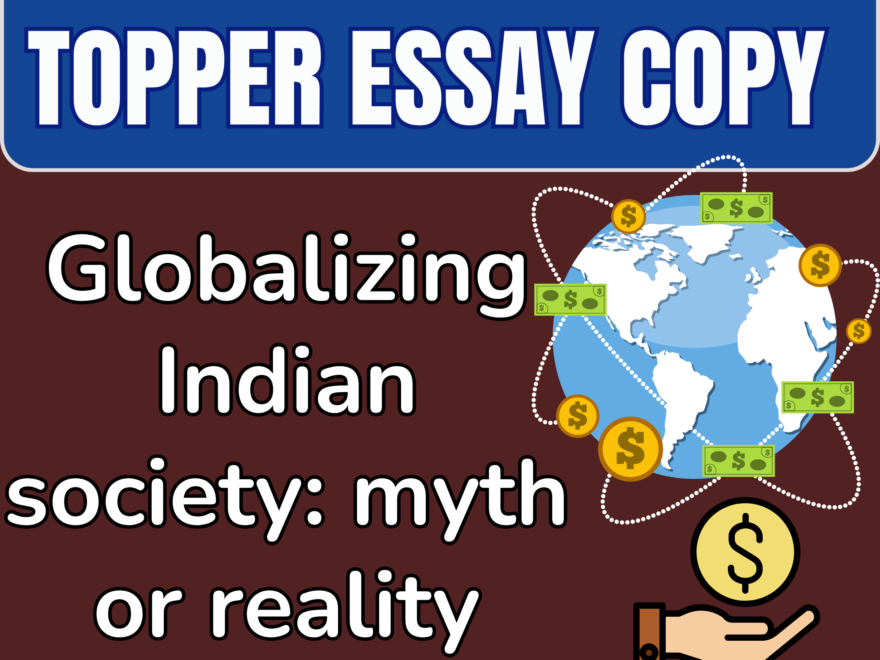IAS, KANCHAN

Essay topic:
(Relevant for Essay Writing for UPSC Civil Services Examination)
“Globalizing Indian Society: Myth or Reality”#1 Savita has come to Delhi to attend her cousin’s marriage being organized according to traditional customs. She joins her other cousins on the dance floor who are grooving to the tunes of Hollywood songs. All these incidents are examples of globalization. Globalization refers to the exchange of goods, services, ideas, money, and people among different countries. Globalization is not new; what is new is the pace at which it is taking place. In this process, Indian society is also not untouched. In fact, India is a truly globalized society that has not only accepted the world’s ideas but also exported its own to other countries. In this essay, we will describe various aspects of Indian society that show the influence of globalization on it. We will also discuss how Indian society is influencing globalization. The essay will briefly look into the arguments or aspects of Indian society that lead some to question the presence of globalization in Indian society. The history of India shows the globalized nature of Indian society. The Hindu community, which traces its lineage to Aryans, were actually immigrants. Various other immigrants like Greeks, Shakas, Hunas, etc., came and merged with the local community. Not just with respect to immigrants, but India also had extensive trade linkages with other countries. The earliest Indian civilization, the Indus Valley civilization, also had foreign trade. India did not just receive foreign cultures; it also exported its culture. For instance, the Cholas conquered Sri Lanka and also extended their influence to Southeast Asian countries, thus establishing Indo-China culture. This shows the globalized character of Indian society. India’s political system and politics are also influenced by globalization. The Indian constitution has borrowed various features from other countries. World developments like the U.S.-Iran conflict influence Indian politics. In turn, India also influences the systems of other countries. For instance, the South African court referred to dissenting judgments in the Aadhar case as the basis of their judgment. All of this shows the give and take in the globalization process. The economic sphere shows the impact of globalization explicitly. Indian handicrafts are world-famous, and countries have been buying them since ancient history. In India, foreign goods show a considerable presence and are quite popular. For example, Apple, Samsung products, foreign cars, etc. The trade war threat is influencing the Indian economy. This interconnectedness in the Indian economy and society has arisen from globalization. Indian societal values and culture have also changed under the influence of globalization. For instance, the joint family and its collectivist nature are slowly turning into nuclear families. The Indian youth are increasingly adopting the lifestyles of Western societies, be it food, clothing, fashion, music, etc. On the other hand, Indian culture is also becoming popular in other countries. For instance, yoga and Indian classical dances. Punjabi music tunes are now being mixed in pop music in countries like the United Kingdom, USA, etc. Thus, the changes in societal practices and culture again show the impact of globalization on Indian society and the rest of the world. In terms of religion too, India has given a lot to the world. It has been instrumental in spreading religions like Buddhism and Jainism to the world. India globalized these two religions which originated in its land. In turn, it helped in the globalization of other religions like Islam, Zoroastrianism, etc. India has also played an important role in globalizing environmental ethics. It has shown the importance of environmental conservation through its efforts like the International Solar Alliance and its commitments towards the Paris Deal. The Indian diaspora has played a key role in globalizing Indian society. Today, the Indian diaspora is present in large numbers in various countries like Gulf countries, USA, UK, Canada, etc. The presence of the Indian diaspora has helped in exporting Indian culture to foreign countries. Indian cuisine, dressing, festivals are quite popular in these countries. They are also influencing the politics of these countries. For instance, the current American president, Mo. Donald Trump, used the popular Indian political slogan to woo voters by saying “Ab Ki Baar Trump Sarkar”. Thus, all these incidents show that not only India has assimilated foreign culture but also Indian culture is being increasingly accepted in the rest of the world, thus showing the globalized nature of Indian society. While all these instances show the impact of globalization on Indian society, some have questioned its impact. For instance, despite all these healthy exchanges, Indian society still practices social evils like caste discrimination, dowry, honor killing, etc. It has accepted material advancements and foreign lifestyles but has refused to leave its inherent social practices like caste and gender discrimination, untouchability, etc. One must understand that globalization is an exchange of ideas, culture, etc., not necessarily reformation. The exchange often brings reforms to societal and cultural practices but does not ensure reforms per se. These social evils can be eliminated with social change catalyzed by legal provisions. Globalization itself does not ensure their elimination but rather helps people to look at different points of view which may encourage them to change. Globalization of liberal values, individualism, human dignity, and other such ideas has brought changes in the practice of these social evils. Hence, again it shows the impact of globalization on Indian society rather than questioning its reality. Globalization is a never-ending process. Societies always remain in a state of transition. A society’s globalization is not determined by the extent it follows a certain set of values. Globalization is not about homogenization. If societies homogenize, then globalization will no longer be there. In fact, globalization itself is a result of diversity and an agent of diversity. When the exchange between two cultures takes place, it gives birth to a new culture. When seen through the prism of celebrating diversity, India appears to be an epitome of globalization. Years of exchange of civilization have given birth to different cultures in India like Indo-Islamic culture or Ganga-Jamuna Tenzeeb, different religions (Hindu religion itself is an amalgamation of many sects, beliefs, quru etc.), new languages like Urdu etc. In fact, the term ‘Indian culture’ itself refers to the heterogeneity of cultures in India that took birth and grew as a result of continuous exchange of cultures or globalization. Globalization is about the bond of interconnectedness and love amidst diversity. It is about making the world a global village in which all retain their identity but are still connected to each other. Indian society is itself an example of this global village. Indian society encompasses almost all communities, races, religions, festivals, culture etc., in one society thus making India a truly globalized society. |
To master these intricacies and fare well in the Sociology Optional Syllabus, aspiring sociologists might benefit from guidance by the Best Sociology Optional Teacher and participation in the Best Sociology Optional Coaching. These avenues provide comprehensive assistance, ensuring a solid understanding of sociology’s diverse methodologies and techniques
Meta Tags:
Water Resource Management,Water Resource Management,Water Resource Management,Water Resource Management,Water Resource Management,Water Resource Management,Water Resource Management, Water Resource Management,Water Resource Management,Water Resource Management,Water Resource Management
Why Vikash Ranjan’s foundation Classes for Essay?
Proper guidance and assistance are required to learn the skill of writing essay topics in CSE examination. VIKASH RANJAN SIR at TRIUMPH IAS guides students according to the Recent Trends of UPSC, making him the Best Essay Teacher for Essay writing UPSC.
At Triumph IAS, the Best Essay Writing Coaching platform, we not only provide the best study material and applied classes of Essay for IAS but also conduct regular assignments and class tests to assess candidates’ writing skills and understanding of the subject.
Choose The Best Essay Writing Teacher for IAS Preparation and Know our Approach for Essay?
- The Programme is Planned & Executed in a Way that You Write a good Essay for obtaining Effective Score of 140 Plus.
- In this programme we provide Classes on
- How to INTRODUCE The Topic in Context of the THEME of the Essay
- How to Elaborate & Explain the Topic-Theme on Temporal Scale & Sectoral Scale as well as Intellectual Scale in the MAIN BODY of the Essay.
- How to Sum up the Topic in CONCLUSION in Context of the Essay Topic Theme.
- ︎We will Teach You How to use the Knowledge Matrix of General Studies & Optional to write a Good Essay more Logically and Coherently.
- After the Classes You have to “Write to Learn & Learn to Score” .This means You have to Write the Essay Test Papers & Learn from the Feedback & Discussions.
Why Essay is Important and What We Offer in “Essay Test Series”?
- Triumph’s Essay Upgradation Test Series (Under Personal Guidance of Vikash Ranjan Sir) doesn’t only focus on improving student’s linguistic skills but also focus on improving student’s ability to comprehend the topic-sentence (subject) recall & relate the facts, concepts, propose thesis-statements, and logically assimilate the ideas & counter ideas with clarity in expression on temporal & Sectoral Scales of knowledge.
- Further students are provided one-on-one INTERACTION* Session with Vikash Ranjan Sir. Students get personal feedback on their strength and weaknesses, regarding what is ‘good about their essay and what more should be done to make it a better one’ by Vikash Ranjan Sir.
Why to take up this “Essay Test Series and Foundation” Course?
- Essay is Low hanging Fruit. Marks in Essay is Effectively Contributing in Final Selection in New Pattern of Mains Exam. With a Well Developed ‘Knowledge Matrix and Rigorous Practice’, One can Score upto 160 + in Essay. So IAS Aspirants should never Ignore Essay Preparation
- Inculcating Writing Competency in Essay for IAS, which is Different from Essay in English, Essay in School and College.
Follow us :
🔎 https://www.instagram.com/triumphias
🔎https://www.youtube.com/c/TriumphIAS
🔎https://t.me/VikashRanjanSociology
Find More Blogs…
| Compare and contrast Karl Marx’s and Max weber’s | Karl Marx- Historical Materialism |
| Position of Women In the Modern Indian Society | Sociology: Social system and pattern variables |
keyword : globalizing Indian Society,globalizing Indian Society,globalizing Indian Society,globalizing Indian Society,globalizing Indian Society,globalizing Indian Society,globalizing Indian Society,globalizing Indian Society,globalizing Indian Society,globalizing Indian Society,globalizing

